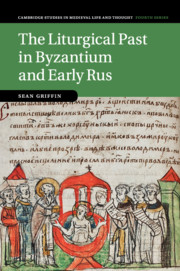Book contents
- The Liturgical Past in Byzantium and Early Rus
- Cambridge Studies in Medieval Life and Thought Fourth Series
- The Liturgical Past in Byzantium and Early Rus
- Copyright page
- Contents
- Acknowledgements
- Abbreviations
- Introduction
- Chapter 1 Liturgy and History in Early Rus
- Chapter 2 The Rus Primary Chronicle
- Chapter 3 Vespers at the Kiev Monastery of the Caves
- Chapter 4 The Dayspring Before the Sun:
- Chapter 5 A New Constantine in the North:
- Chapter 6 A RATIONAL SACRIFICE:
- Conclusion:
- Bibliography
- Index
Conclusion:
The Making of Royal Saints in Early Rus
Published online by Cambridge University Press: 09 August 2019
- The Liturgical Past in Byzantium and Early Rus
- Cambridge Studies in Medieval Life and Thought Fourth Series
- The Liturgical Past in Byzantium and Early Rus
- Copyright page
- Contents
- Acknowledgements
- Abbreviations
- Introduction
- Chapter 1 Liturgy and History in Early Rus
- Chapter 2 The Rus Primary Chronicle
- Chapter 3 Vespers at the Kiev Monastery of the Caves
- Chapter 4 The Dayspring Before the Sun:
- Chapter 5 A New Constantine in the North:
- Chapter 6 A RATIONAL SACRIFICE:
- Conclusion:
- Bibliography
- Index
Summary
The final chapter of the book puts forward a new theory about the canonization of royal saints in early Rus. I suggest that there was a long-overlooked dimension to the creation of these sacred heroes: one that was not exclusively a matter of miracles and investigations, but of narratives and ritual myth-making. Indeed, the medieval hymnography for Vladimir and his kin indicates that an important, and hitherto undiscovered, process had taken place in Rus in the first few centuries after the conversion. The baptismal rites of the Byzantine church had informed the story of Olga’s baptism, and this story later became a part of her liturgical office. The episcopal prayers said during the divine liturgy had helped to inspire the chronicle accounts for Vladimir, which had in turn helped to inspire the hymns chanted on his feast day. The Eucharistic rites had shaped the writing of the chronicle tale of Boris and Gleb, which then subsequently shaped the writing of their early liturgical offices. Hymns became history and became hymns again. Prayers became the written past and became prayers again. Ultimately, it was this liturgical-historiographical-liturgical loop that permitted select members of the Rurikid dynasty to enter into the liturgical past.
Keywords
- Type
- Chapter
- Information
- The Liturgical Past in Byzantium and Early Rus , pp. 229 - 242Publisher: Cambridge University PressPrint publication year: 2019

